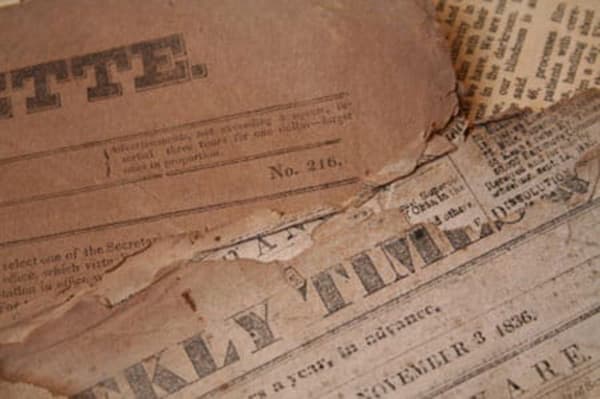If your ancestors are noted in written records as peasants or savages, note that these are, well, relative terms.
Remember the old caution, "There's many a slip 'twixt cup and lip"? As the owner of more than one stained shirt, I can attest to this. Tea and coffee work very well.
How often have we heard some politician speak of his legacy, of how he will be remembered by posterity? The speaker has in mind a knight in shining armour raising a gem-studded chalice to his lips, a Sir Galahad figure to be spoken of with reverence decades after he has left the stage. Think of all the rusty tunics where the cup slipped and the legacy was reduced to an embarrassing stain.

Imagine what you can do with ink… which brings me to my point. So much of what we know about people in the past, your ancestors and mine, depends on the written/printed record, upon ink. This went through my mind as I reviewed some obituaries I'd clipped over the years. One spoke of a man whose idea of great fun was scattering broken glass along his lake frontage to keep kids from swimming near his property. His obit described him as "a caring man, especially fond of children." Another example mentions a chap as "a loving husband," yet everyone knew that, while he was a husband, the loving had taken place with a lady not his wife. With no knowledge other than what's written in these obits, people will have heartwarming images of kindly gentlemen that may be nice, but not true, or at least not fully true.
This process works in reverse as well. How much pleasure does anyone derive from reading an ancestor's name in a list of prisoners, convicts, inmates of poor houses or orphanages? Care to have a forebear who is branded in a written record as a slave, an indentured servant, a serf, a peasant, a popish recusant, a rebel, a savage or illiterate? Early census returns offer further treats for the family historian, with a battery of pejorative terms for a variety of physical and psychological afflictions.
Hold on! Perhaps you need to smooth the corners off the offensive labels. Context to the rescue. The "rebel" was in fact a "patriot" to the other side. The "Tory"? Why he was in fact a United Empire Loyalist. The "recusant," oh, shucks, he was merely a Catholic. "Peasant" covered a vast majority of folks not many centuries ago. Then again, perhaps your ancestors all lived in castles, thereby being part of the Great and the Good. But at the other end of the spectrum, "slave" was not a voluntary status, so no blame can be attached to being one. As for being a "savage," let's just say that it depends on who's talking.
We have to examine bad press-the inky record-of people in the past with care. Sometimes all we have are one or three isolated bits of information, so we don't know the whole story. Human nature, despite centuries of people improving us, has remained surprisingly consistent over the ages. People ate, drank, married and procreated, wondered why they were here and where it was all going. The motives for murder or for prayer have not changed much, if at all.
As a society we have moved far from reliance on oral tradition for most of our information. What gets ink, what is written down in some fashion or other, shapes the ideas of future generations about ourselves and our times, just as we rely mainly on documentary evidence for our account of bygone people and events.
The message cuts two ways. In looking at the past, we must be prepared to understand what we read in the context of the time when it was written. To be illiterate in 1750 was no shame. Few had access to schools and fewer had the freedom from work to attend them. In looking to the future, we need to recognize this basic fact: We will be remembered and probably judged by what is written by or about us.
Step one: try to live so the truth will be to our credit. Step two: failing that, ensure that what does enter the record is favourably expressed.
Dr. Terry M. Punch is the resident genealogist on CBC Radio and editor of Genealogist's Handbook for Atlantic Canada Research.
